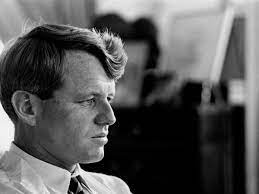Robert F. Kennedy, often known as RFK, was an influential figure in American politics and an advocate for social justice and civil rights. Born on November 20, 1925, in Brookline, Massachusetts, he was the seventh child of Joseph P. Kennedy Sr. and Rose Fitzgerald Kennedy. RFK grew up in a politically active family, and his father’s success as a businessman and his older brother John F. Kennedy’s political rise played significant roles in shaping his own career.
Kennedy’s journey in public service began as a lawyer, but he soon found his true calling in politics. In the early 1960s, he served as Attorney General under his brother’s presidency and played a crucial role in advancing civil rights. He vigorously pursued organized crime and corruption, earning a reputation as a dedicated and fearless advocate for justice.
After John F. Kennedy’s tragic assassination in 1963, Robert F. Kennedy decided to continue his brother’s legacy. In 1964, he successfully ran for the U.S. Senate, representing New York. As a senator, he championed numerous causes, including civil rights, poverty alleviation, and opposition to the Vietnam War. He became a prominent critic of the war, advocating for a peaceful resolution and calling for an end to the violence and suffering.
RFK’s presidential campaign in 1968 marked a turning point in his political career. He ran on a platform focused on social justice, equality, and ending the war in Vietnam. His ability to connect with diverse communities, particularly marginalized and underprivileged groups, resonated with millions of Americans. His speeches, often filled with compassion and empathy, struck a chord with the nation.
Tragically, just as his campaign gained momentum, Kennedy was assassinated on June 5, 1968, in Los Angeles. His death left the nation devastated and marked the end of a remarkable era in American politics. RFK’s untimely passing robbed the country of a potential leader who embodied hope, idealism, and a commitment to justice.
Robert F. Kennedy’s legacy continues to inspire generations of individuals committed to social change. His unwavering dedication to equality and his ability to empathize with the struggles of others set him apart as a leader. Even in the face of adversity, he remained steadfast in his pursuit of a better, more compassionate society.
Today, RFK’s words and actions remain relevant, reminding us of the power of empathy, compassion, and justice. His impact can be seen in the ongoing fight for civil rights, the push for income equality, and the pursuit of a more peaceful world.
Robert F. Kennedy’s life may have been tragically cut short, but his ideals and vision for a better future live on. As we reflect on his legacy, we are reminded of the transformative power of individuals who dare to challenge the status quo and strive for a more just and equitable society.







Recent Comments